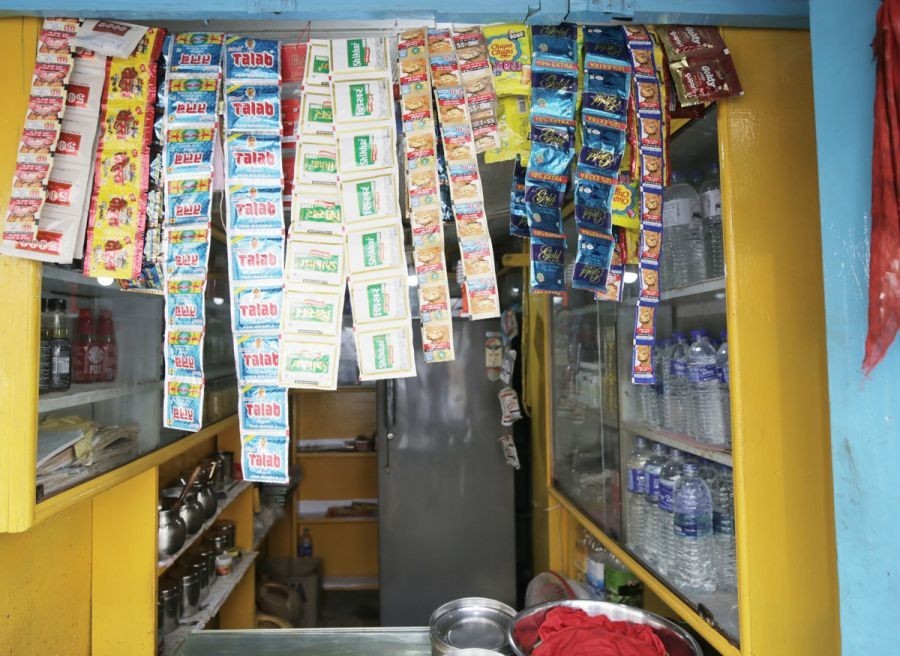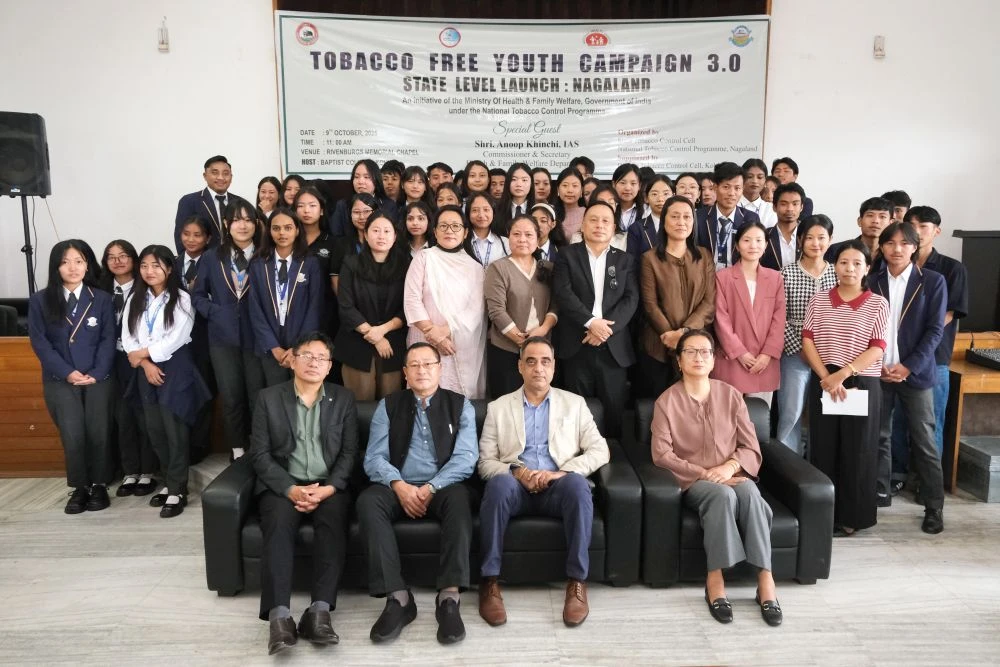Different tobacco products on display for sale in a shop in Dimapur. (Morung Photo)

43% of Nagaland school children use tobacco
Kohima, October 9 (MExN): Describing the launch of the Tobacco Free Youth Campaign (TFYC) 3.0 as both “timely and strategic,” Commissioner and Secretary of the Health & Family Welfare Department, Anoop Khinchi, highlighted the growing burden of tobacco use among both adults and children in Nagaland and the alarming decline in the age of initiation.
Speaking at the State-level launch of TFYC 3.0 held at Baptist College, Kohima, Khinchi said that combating tobacco use requires a shift “from isolated interventions to a system-wide approach.” He stressed the urgency of addressing tobacco use as a major public health challenge through stronger inter-departmental coordination, tobacco vendor licensing, and capacity building of stakeholders.
“Every school declared tobacco-free, every village enforcing the law, and every young person who chooses to say no to tobacco is a step toward a healthier Nagaland,” he stated. Khinchi also administered the Anti-Tobacco Pledge, reaffirming collective commitment toward a tobacco-free generation.
Organized by the National Tobacco Control Programme (NTCP) under the Department of Health & Family Welfare, Nagaland, the State-level launch of the Tobacco Free Youth Campaign (TFYC) 3.0 marked the continuation of a national initiative of the Ministry of Health and Family Welfare (MoHFW), Government of India, first introduced in 2023. The campaign seeks to educate and empower young people to resist or quit tobacco use.
Delivering the keynote address, Dr. Mereninla Senlem, Principal Director, Directorate of Health & Family Welfare, shared that under TFYC 1.0 and 2.0, Nagaland made “remarkable progress” in declaring numerous Tobacco Free Educational Institutions and Tobacco Free Villages while strengthening enforcement of the Cigarettes and Other Tobacco Products Act (COTPA), 2003, and the Prohibition of Electronic Cigarettes Act (PECA), 2019.
However, she underscored that the challenge remains severe. Citing data from the Global Youth Tobacco Survey (GYTS-4), Dr. Senlem said, “43% of school-going children aged 13–15 years in Nagaland currently use some form of tobacco,” a figure reflected among adults as well, according to the Global Adult Tobacco Survey (GATS-2).
In his opening remarks, Dr. Keveduyi Theyo, Mission Director, National Health Mission, Nagaland, reiterated the Government’s commitment to preventive health and behavioural change among young people. He called on students to act as campaign ambassadors, spreading awareness on the harmful effects of tobacco and influencing peers and families to make healthier choices. Highlighting the importance of the 60-day campaign period, Dr. Theyo urged districts to demonstrate innovation and leadership through daily reporting, reviews, and field action.
Presenting the campaign highlights, Dr. I. Simon Sumi, State Nodal Officer, NTCP, outlined the objectives and strategies of TFYC 3.0. He informed that daily reporting and periodic state-level reviews will be conducted, and that a range of activities and awareness drives are planned across districts during the 60-day campaign period.
The event, chaired by Dr. Enünü Sale, Assistant Professor, Department of English, Baptist College, began with an invocation and welcome note by Dr. Kewepfuzu Lohe, Principal, Baptist College Kohima, followed by a special number by Nilly Yitsüthu. The programme concluded with a vote of thanks by Dr. Neingutunuo Angami, District Nodal Officer, NTCP Kohima, who expressed gratitude to all dignitaries, faculty, and students for their participation and support.
The Tobacco Free Youth Campaign (TFYC), initiated by the Ministry of Health and Family Welfare (MoHFW), is a national initiative under the National Tobacco Control Programme (NTCP). It aims to engage and empower young people to reject tobacco use, advocate for tobacco-free environments, and support cessation efforts.
Following the successful implementation of TFYC 1.0 (2023) and TFYC 2.0 (2024) across all States and Union Territories, the 2025 edition—TFYC 3.0—introduces an additional focus on capacity building to equip frontline workers, teachers, and student leaders with tools and knowledge to strengthen implementation.
The previous rounds centered on five strategies: increasing public awareness, ensuring compliance with Tobacco Free Educational Institutions (ToFEI), strengthening enforcement of COTPA and PECA, promoting Tobacco Free Villages, and amplifying youth-led social media engagement. TFYC 3.0 builds on these by promoting a sustained, system-wide behavioural change and fostering a generation of young leaders committed to a tobacco-free India.







